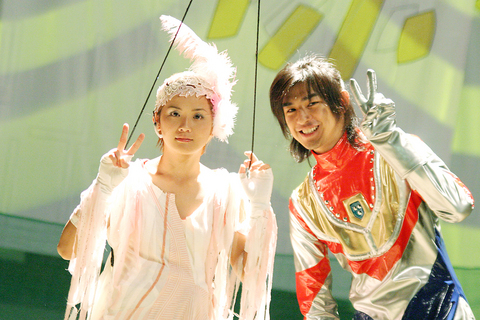Cinema in Taiwan seems to be evolving in two opposite directions. Film festivals have experienced rapid growth in the past decade, with experimental and large-scale international festivals catering for all kinds of movie-goers and communities. Art houses and venues such as Spot -- Taipei Film House and Majestic Cinema also provide alternative channels to help withstand the cultural invasion from Hollywood.
Meanwhile, talk about the death of the Taiwanese film industry can still be heard every now and then. Professionals in the industry and government agencies have knocked their brains out to lure audiences back to local movies but the box office performances of local films remains disappointing, except for the occasional surprises, such as Formula 17 (
According to a comprehensive survey on the film industry in Taiwan conducted by the Department of Broadcasting at National Chengchi University, the number of Taiwanese movie-goers attending local films has dropped from 2 percent to 0.5 percent over the past 20 years, while the number of local films produced annually fluctuated between 20 to 35 in the past 10 years.

Statistics compiled by the Government Information Office show that the number of licensed movie theaters has decreased from 229 in 1998 to 180 this year, while the number of screening rooms has risen since huge cinema complexes have become the norm in recent years.
Movie theaters are earning more money than ever before. Since the 1980s theaters have enjoyed a 20 percent increase in profits. And when the first Warner Village Cinema Complex opened in Taiwan, it grossed over one quarter of the total ticket sales in no time. So, it's good news for international enterprises, but bad news for local filmmakers.
This week it's another of those slack times for local films. However, two idol-packed Asian movies aiming at hopeless romantics and teen-movie lovers are set to brighten up this Chinese Valentine's Day weekend.

One is the Japanese love story Heaven's Bookstore (
Heaven's Bookstore recruits two popular stars from Japanese soaps, Tamayama Tetsuji and Yuko Takeuchi, to co-star in this Platonic love story. The movie develops along two parallel storylines: one in heaven, the other on earth.
For those who are tired of the bombardment of Japanese soaps on TV, Bug Me Not can provide an escape from the reality, in which a group of high-schoolers possessed of super powers take up a mission to save the world.
Directed by Law Chi-leung, who has gained fame from horror flicks such as Inner Senses, the film incorporates animation techniques to create a gang of animated bugs and insects to spice up the comic-book-styled story. Fans of Hong Kong teen-idols such as Chen Bo-lin (陳柏霖), and the girl and boy groups Twins and Boyz will surely enjoy the 90-minute show packed with comedy, action, romance and lots of cute bugs.

June 9 to June 15 A photo of two men riding trendy high-wheel Penny-Farthing bicycles past a Qing Dynasty gate aptly captures the essence of Taipei in 1897 — a newly colonized city on the cusp of great change. The Japanese began making significant modifications to the cityscape in 1899, tearing down Qing-era structures, widening boulevards and installing Western-style infrastructure and buildings. The photographer, Minosuke Imamura, only spent a year in Taiwan as a cartographer for the governor-general’s office, but he left behind a treasure trove of 130 images showing life at the onset of Japanese rule, spanning July 1897 to

One of the most important gripes that Taiwanese have about the Democratic Progressive Party (DPP) is that it has failed to deliver concretely on higher wages, housing prices and other bread-and-butter issues. The parallel complaint is that the DPP cares only about glamor issues, such as removing markers of Chinese Nationalist Party (KMT) colonialism by renaming them, or what the KMT codes as “de-Sinification.” Once again, as a critical election looms, the DPP is presenting evidence for that charge. The KMT was quick to jump on the recent proposal of the Ministry of the Interior (MOI) to rename roads that symbolize

On the evening of June 1, Control Yuan Secretary-General Lee Chun-yi (李俊俋) apologized and resigned in disgrace. His crime was instructing his driver to use a Control Yuan vehicle to transport his dog to a pet grooming salon. The Control Yuan is the government branch that investigates, audits and impeaches government officials for, among other things, misuse of government funds, so his misuse of a government vehicle was highly inappropriate. If this story were told to anyone living in the golden era of swaggering gangsters, flashy nouveau riche businessmen, and corrupt “black gold” politics of the 1980s and 1990s, they would have laughed.

In an interview posted online by United Daily News (UDN) on May 26, current Chinese Nationalist Party (KMT) Chairman Eric Chu (朱立倫) was asked about Taichung Mayor Lu Shiow-yen (盧秀燕) replacing him as party chair. Though not yet officially running, by the customs of Taiwan politics, Lu has been signalling she is both running for party chair and to be the party’s 2028 presidential candidate. She told an international media outlet that she was considering a run. She also gave a speech in Keelung on national priorities and foreign affairs. For details, see the May 23 edition of this column,